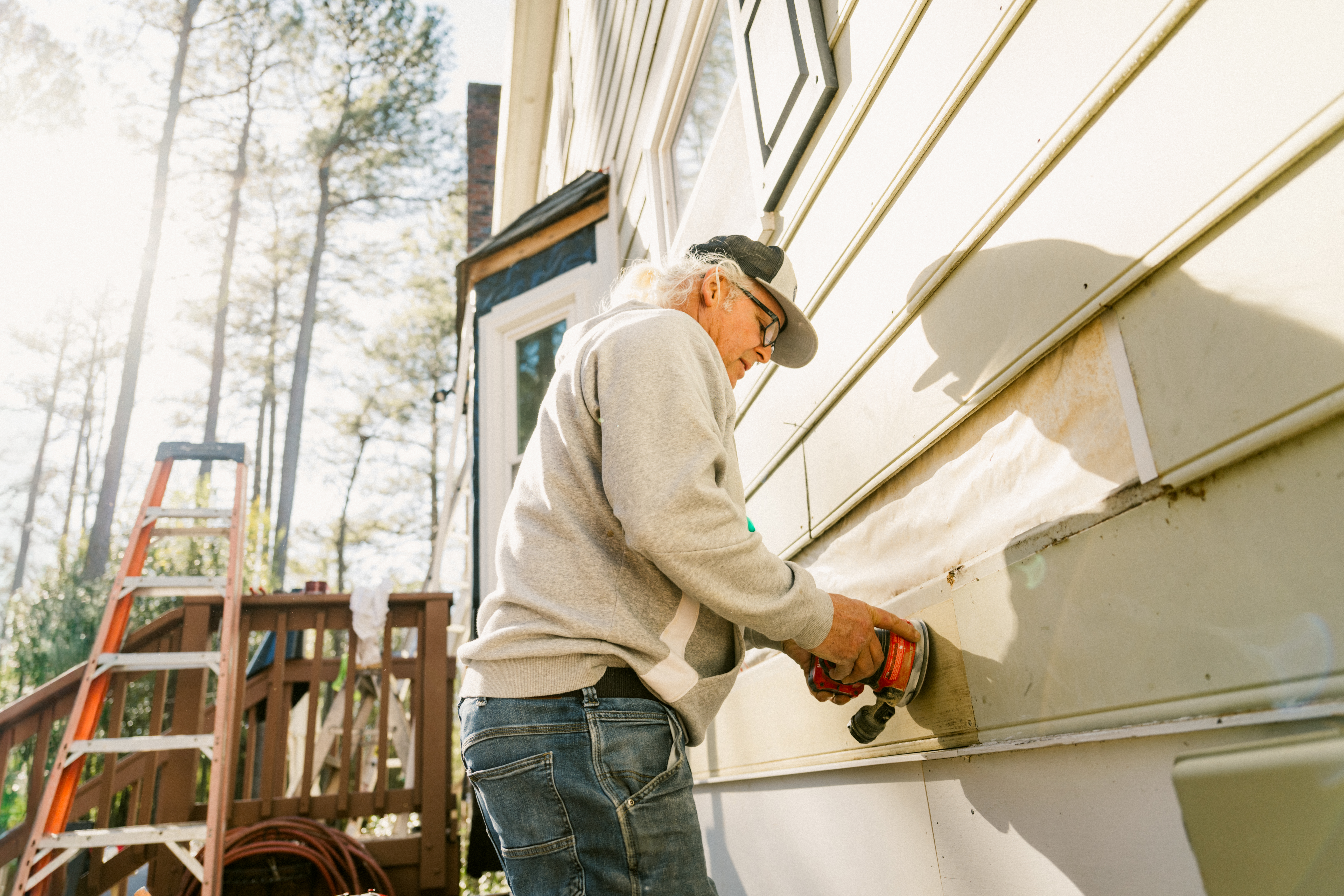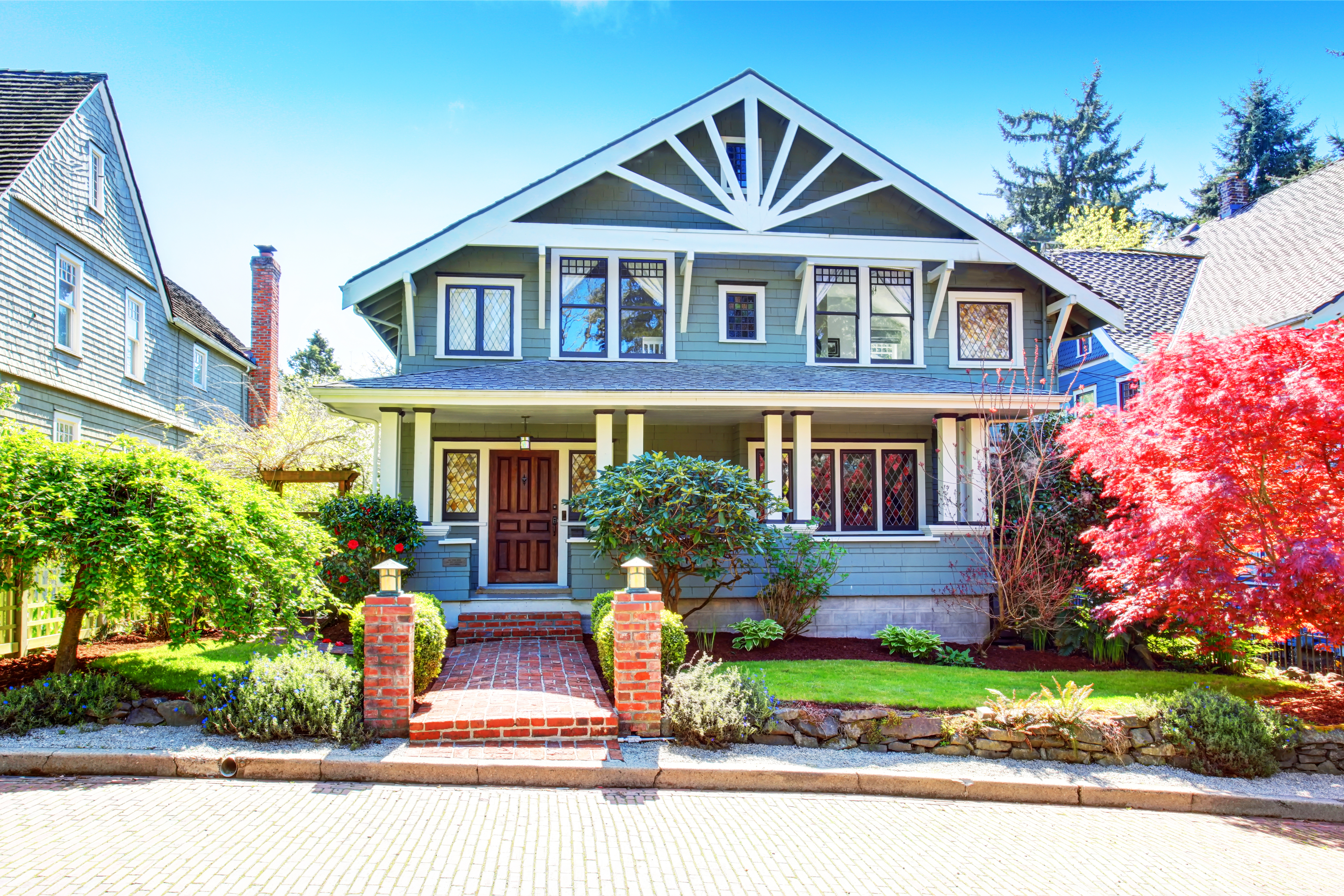
Fiber cement siding is durable, fire-resistant, and affordable. Learn more about fiber cement installation costs in Columbus, OH.
Siding service costs depend on your project and location. Check with a local pro for your specific job.
Siding in St. Louis has to be strong enough to withstand freeze-thaw cycles, intense humidity, and high winds.
Most siding in St. Louis is replaced every 20 to 50 years, depending on how well it’s maintained.
The complexity of your home’s design can affect siding replacement costs.
Siding replacement in St. Louis costs an average of $9,796, but it can range anywhere from $5,725 to $14,204 on average, depending on factors like your home’s shape, size, and siding materials. This guide covers common siding replacement cost factors so you can make an informed budget for this project.
The cost to replace siding in St. Louis depends on variables like the siding material as well as your home’s shape and size. The quirks of older St. Louis architecture can also shift the total price more than you might expect.
The size of your home plays a major role in cost simply because more square footage means more materials and longer installation times. But the complexity of your home’s shape is also important. Multi-story homes or homes with design details like gables, dormers, or bay windows often require custom cuts and slower, more technical work, which can increase your costs.
| House Size (sq. ft.) | Average Siding Cost |
|---|---|
| 1,000 | $1,000–$13,500 |
| 1,500 | $1,500–$20,250 |
| 2,000 | $2,000–$27,000 |
| 2,500 | $2,500–$33,750 |
| 3,000 | $3,000–$40,500 |
In St. Louis, siding has to withstand freeze-thaw cycles, intense humidity, and the kind of wind that can rip shutters off in April. Some materials can do that without constant upkeep, while others require more maintenance.
| Siding Material | Cost (per sq. ft.) | Lifespan (years) | Pros | Cons |
|---|---|---|---|---|
| Fiber Cement | $5–$14 | 50 | Durable; fire-resistant; low-maintenance; resists pests | Heavy; more expensive to install; may crack with freeze-thaw cycles |
| Engineered Wood | $1–$6 | 20–40 | Wood-like appearance; easier to install than wood; affordable | Needs regular sealing to prevent moisture damage, especially in humid summers |
| Vinyl | $3–$12 | 20–40 | Budget-friendly; low-maintenance; wide style range | Can warp or crack in extreme heat or cold; fades faster with full sun exposure |
| Wood | $1–$15 | 20–40 | Authentic look for historic homes; customizable with paint or stain | High-maintenance; vulnerable to rot, termites, and mold in wet or humid conditions |
| Stucco | $7–$9 | 50+ | Energy-efficient; durable when installed and sealed properly | Can crack with foundation shifts or freezing temps; expensive to repair moisture damage |
| Brick Veneer | $3–$10 | 70–100 | Timeless aesthetic; durable; lighter than full brick | Can be costly to retrofit; needs proper drainage to prevent trapped moisture |
| Stone Veneer | $5–$11 | 20–75 | High-end look; works well for accents; lighter than full stone | Expensive; can trap moisture if not installed correctly; rare on traditional STL homes |
| Aluminum | $3–$6 | 20–40 | Fire-resistant; recyclable; resists mold and pests | Dents easily in hailstorms; poor insulation for cold winters |
Siding in St. Louis takes a beating from humidity, ice storms, hot summers, and sudden cold snaps. Wood siding can swell, rot, or attract termites if not regularly sealed, while vinyl might warp in the heat or crack when temps drop fast. Even durable materials like fiber cement or engineered wood need routine checks, especially after storm seasons, to catch moisture damage early.
Staying on top of maintenance can push off full replacement for decades. Depending on the material and upkeep, most siding in St. Louis is replaced every 20 to 50 years.
Plenty of homes in St. Louis were built before modern building codes, so tearing off old siding can uncover hidden problems, like outdated electrical systems. It’s also common to discover rotted wood or insect damage. Depending on your home’s age, there’s also the chance of uncovering lead paint or asbestos, which requires special handling and licensed abatement crews.
While local disposal rules in St. Louis aren’t as strict as in some cities, hazardous materials still mean extra time and cost. In general, it’s smart to reserve 10% to 20% of your siding budget for anything unexpected that turns up once the old exterior comes off.
Homes with complex shapes and details will have higher siding replacement costs. Things like intricate trim, steep gables, and second or third stories can slow down the installation and demand more experienced crews. And some parts of St. Louis have specific historic designations, which might limit the materials you’re allowed to use and potentially increase your costs.
In St. Louis, narrow driveways and limited space between houses can slow down the siding replacement process. Some neighborhoods make it tough to get trucks or dumpsters close to the site, and replacements on multi-story homes often need more time and equipment for the installation. Generally, the harder it is to reach your home’s walls, the more time and cost it takes to finish the job.
Most contractors include standard cleanup in their estimates, but installations that are particularly detailed or complex can generate more waste than expected. If the debris exceeds standard limits or hazardous materials are uncovered, you may need to pay additional fees for hauling and site cleanup.
Design input can add another layer of cost, especially on older or architecturally distinct homes. Hiring a designer or architect might be necessary to preserve historic details, choose materials that fit your home’s character, or meet neighborhood guidelines. These fees can range from a few hundred dollars to several thousand, depending on the scope of the project.

Costs for professional siding replacement involve more than simple labor rates. Factors like local permitting, insurance requirements, and the challenges of working on older homes or in neighborhoods with tight spacing can all increase the final cost.
Siding contractors in St. Louis typically charge between $30 to $60 per hour, or $1 to $3 per square foot. Labor is often the biggest portion of the budget, especially on multi-story homes or properties with detailed trim and complex layouts. Rates may run higher for contractors with experience in historic restoration or when navigating strict neighborhood guidelines.
Siding replacement in St. Louis typically requires a building permit. For most residential projects, expect permit costs to fall between $50 and $250, depending on the size and scope of the work. Homes located in historic districts may also need review and approval from the city’s Cultural Resources Office, which can add both time and cost to the permitting process.
In St. Louis, siding contractors need a city-issued business license and must be registered with the state. They’re also required to carry liability insurance, and if they have a crew of five or more, they need workers’ compensation coverage, too. So before your pro starts tearing off siding, make sure they’re properly licensed and insured.
In St. Louis, sales tax applies to materials but not to labor. The exact rate depends on where the materials are purchased or delivered due to special taxing districts, with most areas falling between 9.68% and 11.68%. Before the project starts, ask your contractor where they source materials and how they’re applying tax, especially if everything’s bundled into one contract.
Larger or more complicated siding replacement jobs in St. Louis might call for more than just a standard install crew:
Architect: Especially useful for homes in historic districts or with original detailing that needs to be preserved or matched, hiring an architect usually ranges from 5% to 20% of the total project cost, depending on the scope.
Structural Engineers: If siding removal exposes framing issues, water damage, or compromised load-bearing walls, you may need an assessment from a structural engineer. Fees typically range from $350 to $800.
Asbestos Abatement Contractors: Many older homes in St. Louis still have siding materials or insulation with asbestos or lead-based paint. Safe removal by a licensed abatement contractor usually costs between $1,200 and $3,300.
New siding has a noticeable impact on curb appeal and can raise your home’s resale value, especially in markets like St. Louis where weather durability matters. Fresh siding signals that the home’s been maintained and offers protection against harsh weather. New siding can also improve a home’s energy efficiency, further increasing home value.
Fiber cement siding tends to deliver one of the highest returns on investment because it holds up well in St. Louis’s humid climate, resists pests and fire, and has a clean, modern look that appeals to many prospective buyers.
Home is the most important place on earth, which is why Angi has helped more than 150 million homeowners transform their houses into homes they adore. To help homeowners with their next project, Angi provides readers with the most accurate cost data and upholds strict editorial standards. We survey real Angi customers about their project costs to develop the pricing data you see, so you can make the best decisions for you and your home. We pair this data with research from reputable sources, including the U.S. Bureau of Labor Statistics, academic journals, market studies, and interviews with industry experts—all to ensure our prices reflect real-world projects.
Want to help us improve our cost data? Send us a recent project quote to [email protected]. Quotes and personal information will not be shared publicly.
From average costs to expert advice, get all the answers you need to get your job done.

Fiber cement siding is durable, fire-resistant, and affordable. Learn more about fiber cement installation costs in Columbus, OH.

New vinyl siding adds value and curb appeal to homes in Columbus, Ohio. Learn about average vinyl siding installation costs in Columbus, Ohio.

The cost of siding repair varies depending on material, design, and damage. This helpful guide covers the siding repair costs to expect in Columbus, Ohio.

Power washers can effectively clean dirt and grime on siding, but there’s a risk of damage. So, can a power wash break siding? Find out more.

Exterior Insulation and Finish Systems, or EIFS, is an exterior finish that protects and beautifies your home. Learn how to install EIFS in five steps.

Want to learn how to install vinyl siding on a house? Keep reading for insight into the whole process from start to finish.